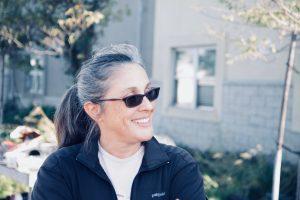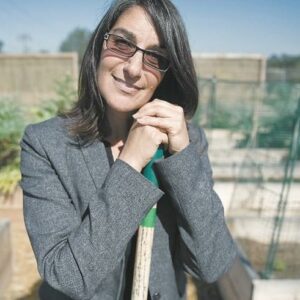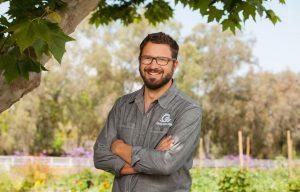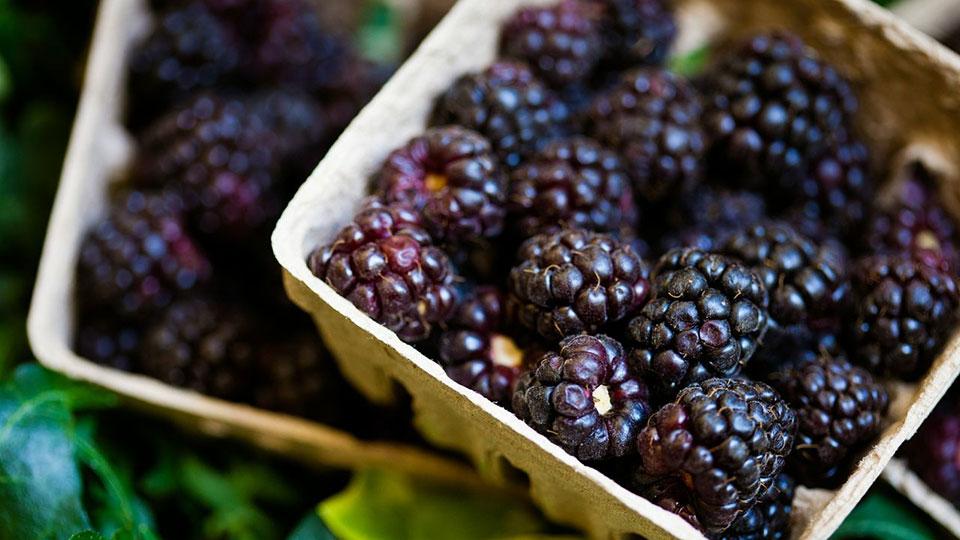Over the past seven years, the annual Berry Good Night dinner has aimed to connect and celebrate local and sustainable farmers, ranchers, fishermen, chefs, and vintners.
In September 2017 we debuted a new format (#BGN100) to increase interaction and engagement. After submitting responses to a brief questionnaire, 100 “idea ambassadors” were hand selected for their commitment toward fundamental change in our food system.
Over the course of 2018, we are profiling a number of the participants to highlight their efforts and create greater awareness and connection within our community.
This month we focus on school and teaching gardens, and speak with the following school garden educators and advocates, and community builders:
- Christina Abuelo, Sherman Elementary School Garden Coordinator, Sherman Heights, CA
- Mim Michelove, Director, Encinitas Union School District Farm Lab, Encinitas, CA
- Daron Joffe, Director of Agricultural Innovation and Development, The Leichtag Foundation, Encinitas, CA

Christina Abuelo
Christina Abuelo, Sherman Elementary School Garden Coordinator
Please tell us briefly about your work and your goals.
I have worked the past nine years at the Sherman Elementary School Garden to bring quality garden education to one of the poorest communities in San Diego.
I’m originally from the East Coast, and my background is in nonprofit management and consulting, primarily for urban grassroots nonprofits. Currently, I volunteer about 30 hours a week for the Sherman School Garden.
Building the garden has taken many, many years; we have been assembling our garden incrementally since 2011 on a run-down part of campus. To build out the garden space, we received product donations and financial support from Ocean Beach People’s Coop, Whole Foods, Home Depot, Ace Hardware, Master Gardeners, the Village Garden Club of La Jolla, Rebuild Global, LT Property Development and City Farmers Nursery. Currently, the garden space comprises 14 raised beds, additional in-ground planting space, several dwarf citrus trees, three composting stations, benches for seating and a tool shed. We grow seasonal edible fruits and vegetables, flowers, succulents and butterfly bushes.
The after-school Garden Club started quite small, with just a handful of students, and has steadily grown over the years. In December 2017, we had a special session for kindergartners and 75 students signed up! A few years ago, in order to accommodate the growing number of students who were interested in the Garden Club, we started fundraising to hire professional garden educators. We hustle all year, hosting a fall book fair and selling Mexican garlic braids, potted plants and raffle tickets in the spring to raise funds for these educators.
Ironically, even though my professional accomplishments from my nonprofit days have been recognized nationally and internationally, this is the hardest thing I’ve had to do. There is no financial support from the school as its budget has been cut to the bone (e.g. no librarian, art teacher, PE teacher, and supply room looks ransacked). And there are very few financial resources in the greater school community. The lack of money is compounded by not having the typical fundraising resources of a 501(c)3.
But, I persisted. I saw how kids in our afterschool garden club were being positively impacted. I saw the garden as a vehicle for creating happy, healthy, nature-connected kids. I am a subscriber to Richard Louv’s theory about “nature deficit disorder” and I saw how the school garden was an oasis for kids who live where the streets are too dangerous to play outside. I saw children who suffered from food insecurity eagerly harvesting, preparing and eating fresh vegetables. I have been influenced by Common Threads, an organization that considers cooking healthy foods a life skill, so I have started incorporating cooking lessons into Garden Club.
Our school faculty has a Garden Team which helps with the planning of Garden Club. Teachers volunteer their time to provide supervision for our after-school Garden Club. This enables us to operate as an extension of the school day and not have to come in as an outside organization, which would have to pay facility rental fees and provide $4 million insurance coverage. The garden is a continual work in progress, but one of our most important priorities is sustainability. In late 2016, we partnered with a fiscal sponsor, Leah’s Pantry, to provide payroll services for our garden educators.
We also have many parents who volunteer for the garden in different capacities. One of our ace volunteers is Sarah Garcia, an artist and gardener who helps develop curriculum and teaches lessons during Garden Club. Many of our volunteers live in deep poverty and a subset are undocumented. I believe strongly in inspiring and supporting grassroots leaders in refining their potential; this is an area I’d like to expand in the future.
What interesting connections did you make at BGN100?
I enjoyed connecting with the folks sitting at my table. The Konyns suggested I contact 4H, and because of that, later this year several 4H clubs will be joining Sherman Elementary School for our Garden Festival. Brijette Romstedt donated some gardening supplies and I recommended a grant funding source that may be able to help her expand her business. I found it interesting that two female attendees asked me how long I spend shuttling my kids around in the car. One mom told me her morning and afternoon drives took nearly 2 and a half hours. Another mom said she had spent four hours picking up and dropping off kids the previous afternoon. I think this speaks to some of the barriers women face as we try to make change in the field of food justice. We’re still typically the primary caregivers so we have to compress a lot of work into our day because of all our family responsibilities. I also connected with Mim Michelove, who is a total goddess [see Mim’s profile, below].
What other ways do you connect with like-minded members of the community to further your mission?
Facebook. I don’t have a lot of time to go out. However, I’m a strong believer in networking and building relationships. One of my frustrations is that many organizations’ curricula is proprietary. I’ve started a Facebook group for San Diego area garden educators to share resources and ideas. I’m committed to sharing ideas and lessons we develop with other garden educators.
When you’re not working, what do you enjoy doing?
Honestly, this is a difficult question to answer. I have kind of a fanatical and unhealthy devotion to the Sherman garden. If I had more time, I’d be reading, gardening (at home!), cooking, traveling and going to the beach. But there aren’t a lot of financial and other resources at our school, so the task of keeping the garden program going largely rests on my shoulders. I worry that if I walk away, the program for these disadvantaged kids vanishes. So, I’m a whirling dervish.
Do you have any favorite anecdotes about gardens you’d like to share?
There are many small moments, with video links below. This is one is from early on: One day I was working in the garden and a second-grade teacher came outside with his class. The garden gate was locked, and no one had a key – one of my many frustrations. The teacher told me that in science class they had watched caterpillars metamorphose into butterflies and they wanted to release the butterflies inside the garden. I was frustrated that I couldn’t let the students in through the gates. The kids gingerly handed me two butterflies through the fencing, I opened my hands and released the butterflies. With their hands still clenching the railing, the children eagerly watched as their school project fluttered away.
Students chanting for more cooked kale

Mim Michelove
Mim Michelove, Director, Encinitas Union School District Farm Lab
Please tell us briefly about your work and your goals.
I am a big believer in supporting healthy kids and a healthy planet through quality education, authentic experiences, and access to fresh, real food. Through various nonprofit organizations, the City of Encinitas and the Encinitas Union School District (EUSD), my work has included the creation, re-creation, and support of numerous school garden programs in San Diego County. With these organizations, I’ve helped to transform a school district into a state and federally recognized Green Ribbon district where students participate in – and have educational opportunities around – the green initiatives that also translate into over $800,000 in annual savings.
My most heartfelt accomplishments have been in creating and building community-based programs like the Ocean Knoll Farm, and the EUSD Farm Lab and DREAMS Campus. The mission of these programs is to integrate outdoor education into general education while offering connection to our planet, our neighbors both locally and globally, and to wrap social responsibility and community values into the fiber of our programming and lives.
Another significant project was helping Encinitas design and plant the first organic fruit grove and organic educational garden on public land. Looking back over the last decade of my work, I now see that supporting San Diego’s garden programs and creating the farms and Farm to School program in Encinitas has led me to, and attracted, some of the most profoundly meaningful partnerships and relationships of my life. These influences have inspired and propelled me into establishing the nation’s first school district-owned, certified-organic farm that grows for its own lunch program – which has helped to transform Encinitas’ school lunch from packaged to fresh.
As the Director of the EUSD Farm Lab, I recently ushered in the partnership between The Ecology Center and EUSD which has made another dream come true. The Ecology Center (TEC) shares my vision to educate, inspire, and empower, and it is thrilling to see them expanding to Farm Lab and realize that, together, we will soon be able to reach beyond our 5,400 students to their families and to the greater community. It is exciting to include the many stunning educational opportunities from TEC in our partnership, like Road Trip, their super cool double-decker mobile classroom. The Ecology Center has the vision and capacity to consistently bring the community together through workshops and events that promote good ecological design, sustainability, and “creative solutions for thriving on planet earth.” How could anyone ask for more than that?!
What interesting connections did you make at BGN100?
It is hard to choose from all the many amazing people I met and connected with at BGN100. First, I was honored to be invited. The location (OMG, Michelle’s garden), the food, company, and discussions were off the charts. At my table, I got to meet people from all over the world. I also saw Curt Wittenberg and sampled (and appreciated) the Queso Diego group’s locally made cheeses. I connected with Curt’s wife Nan Sterman from the phenomenal show A Growing Passion. I shared good conversation with Farmer D from Coastal Roots Farm [see his profile, below] and the ever-inspiring Danielle Nierenberg from Food Tank. I had a chance to connect with Zen Honeycutt from Moms Across America [see BGN Profiles February 2018] which turned into a video blog that we did together shortly afterward about healthy school lunches. It was also a treat to see the incomparable and magical Carolyn Kates in her element, blissfully enjoying the event [see BGN Profiles February 2018].
What other ways do you connect with like-minded members of the community to further your mission?
I love to support anyone who is trying to make change in a thoughtful and elegant manner by attending their events – if only I could clone myself to support more efforts! Meetings aren’t necessarily my happy place, but my favorite work moments are spent with mission-aligned partners and brainstorming with people and organizations that engage and educate without a lot of ego, pretense, or an avalanche of trendy jargon, and who understand the authentic power of collaborative capacity.
When you’re not working, what do you enjoy doing?
This is a joke question, right? I am a life-long learner but have yet to learn that elusive work/life balance that people talk about! My best non-work moments are filled with friends and family, having some quiet time, connecting to nature…or if possible – sleeping in.
Did you have a breakthrough moment that inspired your work, or a favorite anecdote about gardens you’d like to share?
My work is entirely inspired by becoming a mother. Like all parents, I believe that EVERY child should grow up feeling valued, receiving quality education, and learning habits that promote personal health and the health of our planet. I believe that there is NOTHING more important than investing in our children’s well being, in fact, it is our responsibility and privilege to invest in every way – financially, creatively, and with our sleeves rolled up – in creating a world that is welcoming, well-educated, resilient, and offers equal access to jobs, clean air, safe water, and healthy food. I have found that one of the best places to address all of these issues and to build a community of like-minded, community-centric people is in our school and community gardens. I am grateful for the many open-minded, brilliant, loving, and generous people I have met along my path, who continue to inspire me to do better, and to be better.

Daron Joffe
Daron Joffe, “Farmer D”, Director of Agricultural Innovation and Development, The Leichtag Foundation
Please tell us briefly about your work and your goals.
I am the Director of Agricultural Innovation and Development at Leichtag Foundation, Founding Director of Coastal Roots Farm, and Founder of Farmer D Consulting. My passion lies in building community through food and farming, and I’ve discovered the power of farming to build community. My work in community farming also focuses on social justice, social entrepreneurship and education from youth to farmers, and I’m humbled and inspired by the people and activities of the sustainable farming movement.
The Leichtag Commons property in Encinitas is 67.5 acres, with the nonprofit Coastal Roots Farm making up roughly 15 acres of the site. Coastal Roots Farm is certified organic and is comprised of about three acres of productive educational gardens, a three-acre food forest trail, about five acres of silvopasture with chickens, an on-farm compost operation and a 2.2-acre vineyard.
Coastal Roots Farm cultivates healthy connected communities by integrating sustainable agriculture, food justice and ancient Jewish wisdom. The farm is a source of healthy organic food, models community farming best practices, hosts Jewish rituals and celebrations and works to strengthen food security in North County San Diego. The Farm provides educational programs on gardening, nutrition, local food systems, and sustainable farming practices, and donates a majority of the produce it grows through a pay-what-you can farm stand, free pop-up farm stands at Camp Pendleton and Vista Community Clinic as well as direct donations to local food pantries and partners such as Community Resource Center and Kitchens for Good. The Farm leverages social enterprise ventures to support and scale its mission and seeks to collaborate with partner organizations to utilize the farm and farm team to engage the community in educational events and activities.
I started Farmer D Consulting in the mid 2000’s after launching the farm at Serenbe near Atlanta, Georgia, and joined the Leichtag Foundation as the Director of Agricultural Innovation and Development in 2014. Farmer D Consulting is now a social enterprise of Leichtag Foundation committed to sustainable, just and vibrant food systems, and provides professional farm planning, design, implementation and management services for a wide range of community farm and garden projects. We believe farming, gardening and good food can transform lives and communities by providing solutions to many of the most pressing issues facing humanity.
Part of the reason why I wrote my book “Citizen Farmers” was to inspire communities across the country of different faiths, public community projects, private community projects, to really look at the benefits of incorporating agriculture, especially community-based farms, into where they live. When you can apply the principles of community farming and sustainable agriculture with a social mission, an educational mission and economic mission in different venues, there’s just so much good that can happen.
What interesting connections did you make at BGN100?
It was great to meet other people working in the food and farm sectors; I made some nice connections for future collaborations as well as spending quality time with people I have previously met but don’t often see.
What other ways do you connect with like-minded members of the community to further your mission?
I wish there were more opportunities to connect with others working in this field. We need more gatherings and conferences where we can learn, grow and celebrate together.
When you’re not working, what do you enjoy doing?
Spending quality time with my wife and three kids. Playing games, camping, going to the beach and gardening with them at home.
Did you have a breakthrough moment that inspired your work, or a favorite anecdote about gardens you’d like to share?
I’ve had several breakthrough moments over my 25 years working in this field. It’s mostly through relationships with other like-minded people that have opened new doors which have given me the opportunities to pursue my passion and further my career.
In May, the Berry Good Food Foundation hosted “Seeds for the Future”, an interactive, multi-course dinner featuring chefs Brian Malarkey, Shane McIntyre, Adrian Mendoza (Herb & Wood); Andrew Bachelier (Campfire); and Brad Wise (Trust) with featured emcee Sam “The Cooking Guy” Zien. This fundraising campaign supports school garden scholarships in San Diego County that enhance the teaching of agriculture and healthy eating.
Seeds for the Future Event Recap





